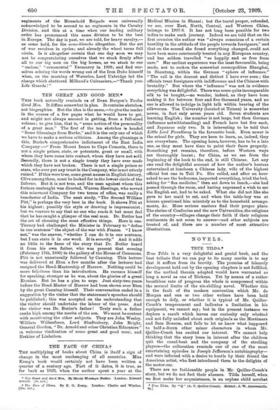THE FACE - OP CHINA:t THE multiplying of books about 'China
is itself a sign of change in the most unchanging Of all countries. Miss Kemp's book would certainly not 'have been written a quarter of a century ago. Tart of it dates, it is true, as far beak as 1893, when the author spent a year at the • Ten Great and Good lien. By Henry •Montagn-Btrtler. London: Edward Arnold. Las. net.] t The Paw of China. By E. G. Kemp. liondon : Matto and Mindwi. [208. net.]
Medical Mission in Shansi ; but the travel proper, extended, we see, over East, North, Central, and Western China, belongs to 1907-8. It has not long been possible for two ladies to make such journey. Indeed we are told that on the first occasion the author was "always conscious of a certain hostility in the attitude of the people towards foreigners," and that on the second she found everything changed, could not have been more courteously treated in any European country, and has seldom travelled "so happily and so free from care." Her earliest experience was the least favourable, being made, not to reckon the somewhat cosmopolitan Shanghai, in Shantung, within the German "sphere of influence." "The rail is the dearest and dirtiest I have ever seen ; the officials treat foreigners with indifference and the Chinese with brutality." But where the " influence " was not in evidence everything was delightful. There was some quite incomparable silk to be bought,—no wonder, indeed, as they have been making it for between four and five thousand years, and no one is allowed to indulge in light talk within hearing of the silkworms. The University (located at Tsinan) is somewhat newer, in fact only seven years old. Seven students are learning English ; the number is not large, but then German (influence notwithstanding) and French have but five each, and Japanese only two. It is interesting to be told that Little Lard Pauntleroy is the favourite book. Even newer is the school for girls. They are keen to learn, as, indeed, they are everywhere. The opening hour, however, has to be a late one, as they must have time to paint their faces properly. Something yet remains, therefore, before Western ways are thoroughly learnt ; for China, as we see from the beginning of the book to the end, is still Chinese. Let any one read the delightful account of how the author's hostess entertained at luncheon a Chinese lady, wife of the highest official but one in Tali Fu. She called, and after an hour asked to see the bedrooms, inspected everything, tried the bed, asking for "flea medicine," then sat down to lunch,—she had passed through the room, and having expressed a wish to see the English eat, had to be asked. What she did not like she gave to her -maid to eat, and when the table-boy was at leisure questioned him minutely as to the household arrange- ments, Scc. More serious matters find their proper place. The shrine of Confucius and the new Universities, the religions of the country—villages change their faith if their religious sentiments do not seem to answer—and other subjects are treated of, and there are a number of most attractive illustrations.










































 Previous page
Previous page